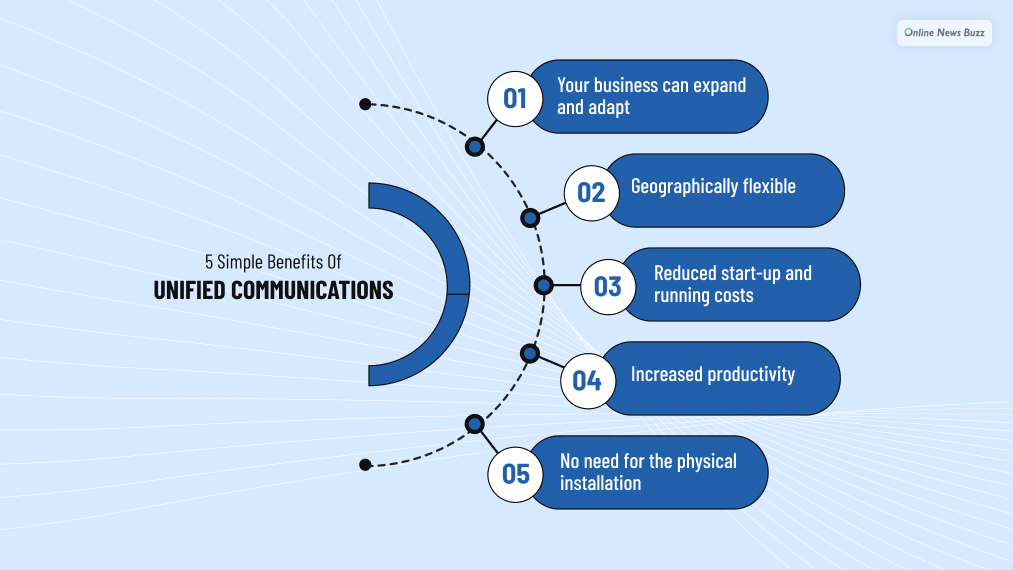
Unified communication is a term that you have no doubt seen more and more frequently over the years when it comes to customer-facing technology services. As technology grows and develops rapidly, keeping updated with the newest things is becoming harder.
Here, we will explain what unified communications means and five simple benefits of why you need unified communications in your business.
What is ‘unified communications’?

‘Unified communications’ is when users communicate over multiple media and devices using a set of synchronizing products or one single product.
This means a unified communications software can combine all communications tools, such as instant messaging, voice, audio, video conferencing, data sharing, and more.
These services are usually accessible through a downloadable app or web portal and can be used on all devices.
Types Of Unified Communications Systems
Now that you know what Unified Communications systems are, you must know about the different types of UC systems.
Cloud-Based Unified Communications Systems
Unified communications systems integrated with cloud servers are game-changing because they automate your communications. Service providers manage the cloud-based UC system, which functions through a web provider.
If you have internet access, you can use this system for communication in any form, and your data is also secured. I love cloud-based UC systems because I can access them anywhere using the internet.
Another advantage of cloud-based UC systems is accessing them on any device, whether a laptop or phone.
On-Premises Unified Communication Systems
On-premises UC systems are managed in-house or onsite. So, you have access to the system when you’re onsite at your business. Additionally, you are required to keep a designated in-house IT staff, which can be expensive.
Furthermore, you must purchase the required equipment, house a server, and maintain your UC system.
So, if you have on-premises UC systems, you can customize them to suit your business needs. Therefore, if you have the finances and require greater control of your UC systems, then go for this UC system.
5 Simple Benefits of Unified Communications

There are many benefits to using unified communications in your business, but here are some examples.
1. Your business can expand and adapt
As unified communications work through an application or web portal, this service is called ‘cloud based.’ Everything is accessed online. This means that if you need to move offices, there is no need to transfer physical infrastructure. If your business expands, you can also easily upgrade your tariff to suit your new running standards.
2. Geographically flexible
During this year, due to the COVID-19 pandemic, almost half of the UK worked from home at some point. The greatest benefit of unified communications is that the service can be used wherever and whenever needed, with no change or fuss. This means employees can easily work remotely as efficiently as they would in the office.
3. Reduced start-up and running costs
With no need to purchase new physical infrastructure, unified communications come with a low start-up cost. Also, tariffs are usually based on your actual usage and can be adapted at any time. Using this solution saves you a lot of money in the long run.
4. Increased productivity
Your business communications system can really increase in performance, whether it is the performance of the communications themselves or the overall performance of your workforce. Unified communications reduce the need for your employees to dig for the information they need or ask for support from a colleague on a separate platform, as this is all contained in one application, therefore increasing productivity.
5. No need for the physical installation
This has been a strange time for us all, and as we all strive to stay safe and healthy, potentially, the most relevant benefit is that there is no need for physical installation. You can allow contractors in your home or office for essential work, in line with current government guidance. Therefore, to stay future-proof, why not consider unified communications for your business?
Components of Unified Communications
There are three unified communications components: messaging, voice calling, and web conferencing. Let’s learn in detail about these capabilities in UC systems.
Messaging

You can message and communicate with different members of your team. Several divisions work together in a company to provide a service or product. Different teams need a space to contact each other to exchange information, which is done through the messaging feature on UC systems.
Additionally, you get email, live website chat, messages on social media, and text messages on integrated apps like WhatsApp. Furthermore, you can use unified messaging to communicate your message to your teammates.
Using unified messaging, you can share files and documents, auto-reply, share threads, store files, use notifications, and real-time sync conversations.
Voice Calling

You can make video and audio voice calls using unified voice-calling tools. Do you wish to forward your call to another department or team member? You can easily forward your call through the unified communication system and even route calls.
Want to connect with your team members or call for a face-to-face meeting? Then, real-time web conferencing is the best way to collaborate with teammates.
Additionally, you can access in-chat meetings, give presentations or attend them, share screens, and collaborate with external members. Furthermore, you get automated summaries and transcripts of your meetings.
Web Conferencing

Want to get in contact with your teammates while on a call with a customer? Then, try the team collaboration tools on unified communication systems to facilitate team meetings.
Additionally, you can facilitate communication between not only your team members but also across different departments. Furthermore, you can also use these tools to communicate through video calls.
Conclusion
Ultimately, unified communications unify your business communications across all channels. Be it voice and video calls or digital communications, offering a better collaboration opportunity.
You can better your workflow and streamline your business communication using UC systems at your workplace. Additionally, you can switch between different devices when using unified communication as a service (UCaaS).
Furthermore, your live interaction with customers improves when you can connect with different departments to solve customer problems. This improves customers’ experience and enhances your business.
Read Also:




























